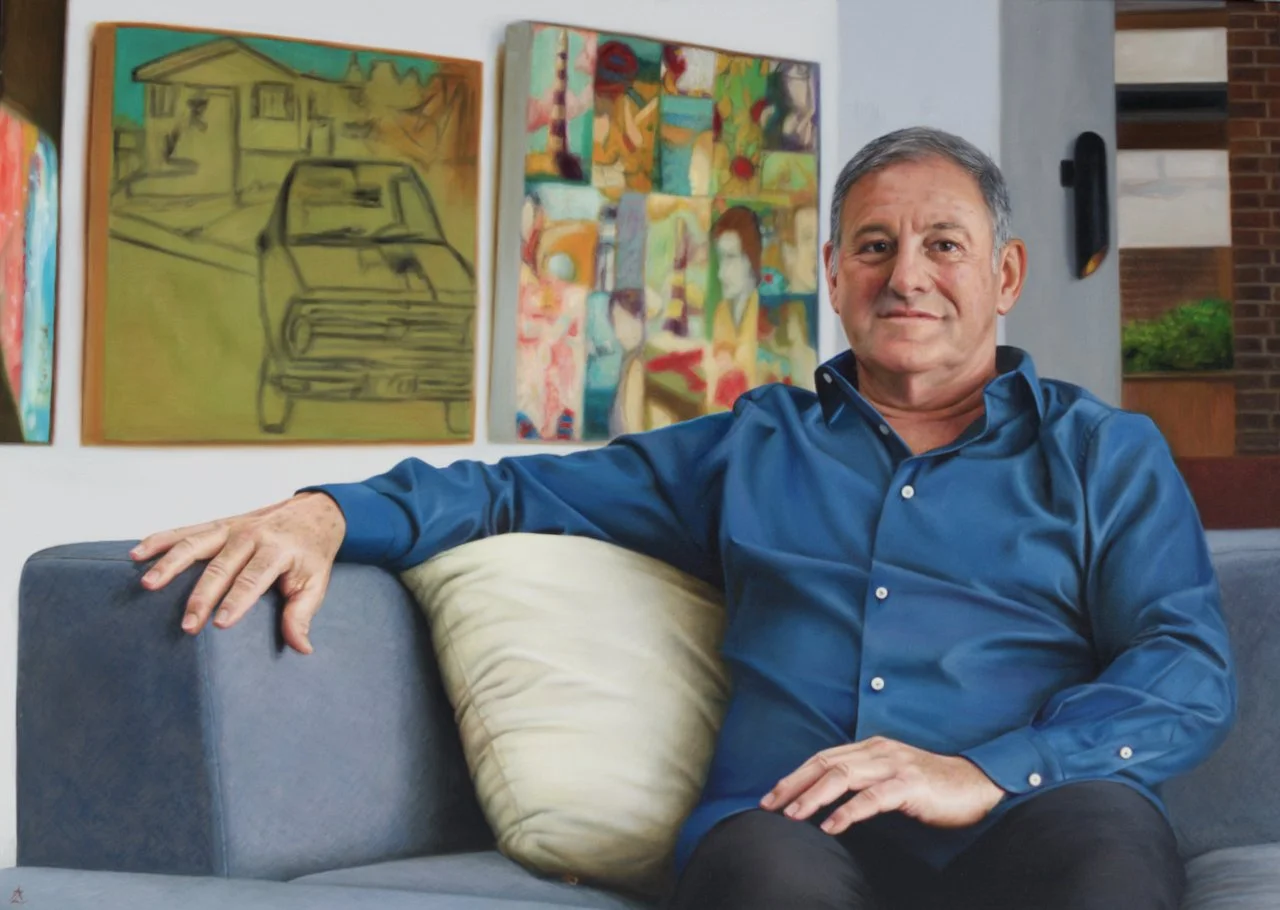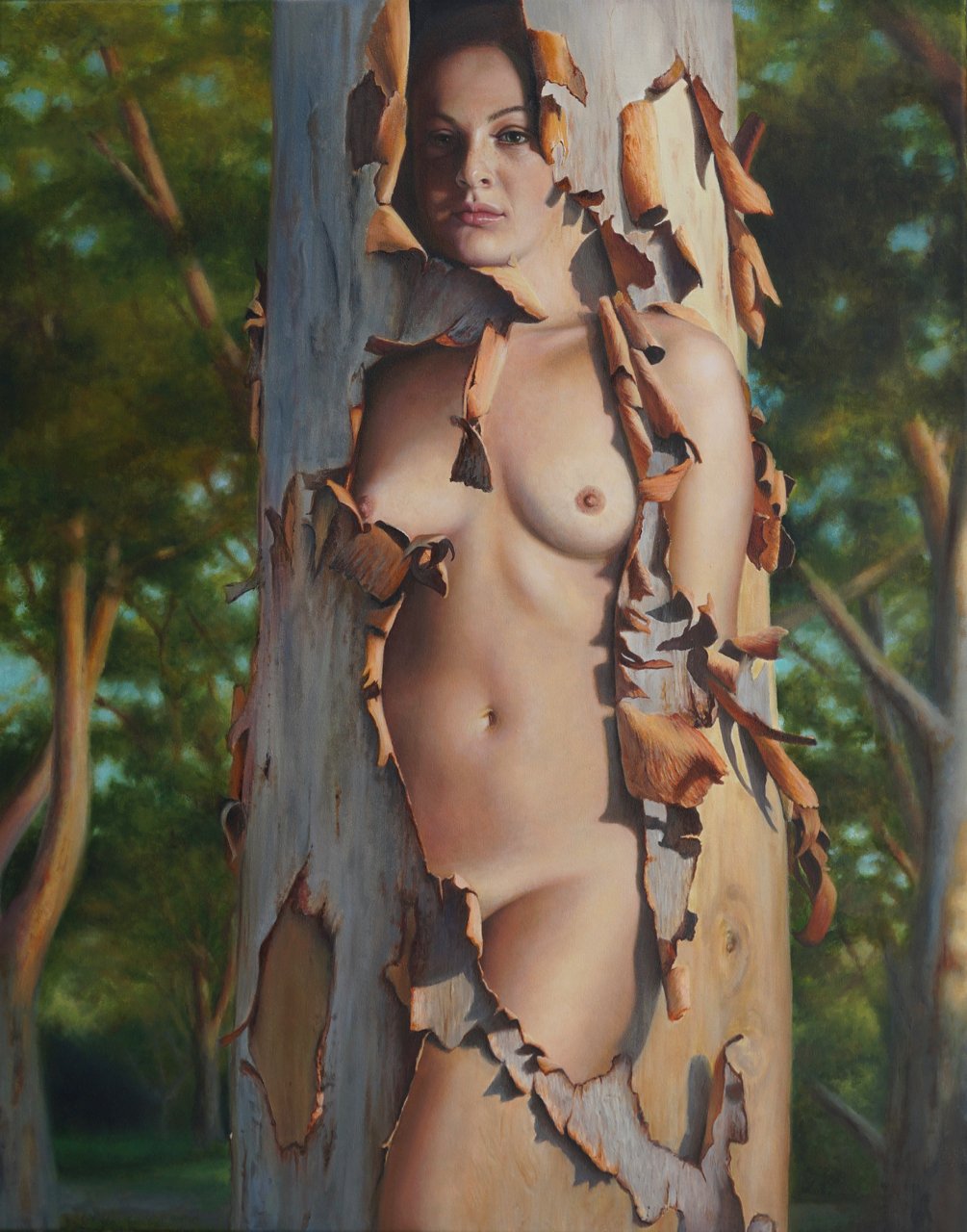Artist Anne-Marie Zanetti
Anne-Marie Zanetti is a familiar face amongst the finalists in the Boynes Emerging Artist Award as she earned her place as a finalist in the 4th Edition and more recently, in the 5th Edition. Congratulations to this talented Australian artist!
Who are you?
I am wholeheartedly living my dream as a full-time artist. My husband and I settled into a lovely suburb of Brisbane 24 years ago, this house is where we raised our family and I began my journey as an artist. I was seven years old when my family first moved to Brisbane and, as one of six children, I filled my childhood with creative experimentation from drawing and painting to sewing and even woodworking, probably to escape the chaos! Circumstances beyond my school years led me into many varied roles, some creative, like when I started my own children’s clothing label, and some less so as Payroll manager for an airline! Whilst my art took a back seat for a long time, I am grateful for all the skills I acquired over this time, particularly in my multi-faceted role as a mother, as the accumulation of all I have experienced has equipped me to negotiate the landscape of an art career.
The opportunity to nourish my creative spirit came once our children grew. My wonderful husband said ‘take a break for a year and do what your heart desires (well not quite those words but you get the idea) and I did just that. As my youngest child entered school, I set myself up at home and began to experiment and create for as many hours as mothering would allow. A ‘years break’ turned into my full-time passion for painting.
Since making the commitment to my art I have been fortunate enough to learn from some very talented artists who inspired me to dig deeper and achieve more. Now, as an ‘empty nester' I have a lot of extra time to indulge in my passion!
“Metamorphosis” [Winning Work]
By Anne-Marie Zanetti
Oil on Canvas
Can you discuss the inspiration and thought process behind "Metamorphosis"?
I have long admired artists who skillfully convey their ideas about female beauty. Only recently, after many hours of observation and conceptualization of the idea, have I ventured into painting the nude female form. I am fascinated and a little daunted by the difficulty of capturing the form for its sensuousness and appealing nature without being erotically suggestive.
Metamorphosis was the third painting in a series of nude works I completed over the last two years. Perhaps the extra time in the studio due to the pandemic was the necessary impetus I needed to bring my planning to fruition. This piece emanates a stronger, more open impression than the vulnerability of the first two paintings. In all three renderings, I worked hard to be sensitive and respectful to the magnificence of the female form.
“Quiet Reflection”
By Anne-Marie Zanetti
Oil on Canvas
The colour palette of "metamorphosis" compared to your other works is quite warm and toned down. Is this on purpose? And why?
“Metamorphosis”, like the other works in this series, was intentionally rendered with a limited palette. In all the paintings I wanted the focus to be on the curve of the form and the unique qualities of the skin.
With “Metamorphosis”, I was interested to see if I could maintain the focus on the figure using just light and a change in pattern and detail, whilst maintaining a similar tonality across the canvas. I really love the similarity between the hair colour and the timber carving and accentuated this resemblance by highlighting the hair.
“Jacqui”
By Anne-Marie Zanetti
Oil on Linen
What drew you to exploring portraiture as a subject matter?
Initially, I think I was drawn to portraiture as a way of connecting. As humans, we have a deep desire to feel connected to one another. As babies we need to bond with our carers for our very survival, so we are hard-wired to examine and interpret the non-verbal communication conveyed through facial expressions, touch and energy. This innate ability and learning continue throughout our lives, improving our ability to connect and therefore feel safe and loved.
Whilst there is an innate reason I am drawn to observing and recording people there is also my fascination with our inner world, both psychological and spiritual. I believe we can learn so much about the interconnectedness of the world and our own true nature from examining our own (and others) behaviours, thoughts and feelings. The more we understand about ourselves the more we can connect on an authentic level with each other. My portrait painting has become an invaluable tool in observing, processing and understanding these concepts of connection and self-awareness.
And then there’s the challenge of creating a portrait painting! There is nothing more satisfying for me than when I feel I have captured a person’s essence in a portrait. This challenge keeps me enthralled with this genre of painting.
“Don”
By Anne-Marie Zanetti
Oil on Linen
What do you hope to communicate with your portraits?
For me, it’s about the emotional responses of all those involved - the sitter, the viewer and particularly myself. Rendering ‘likeness’ is important because the disparity in a portrait can cause distraction and for me, this can be a missed opportunity to take the viewer (and myself) on the journey of gaining insight into the sitter. My ultimate aim when creating a portrait is to find and express my impression of the sitter’s essence and spirit and hope that some of that translates to the viewer.
“Dean Merlo more than coffee”
By Anne-Marie Zanetti
Oil on Linen
Can you talk about your biggest learning experience during the process of painting your portraits?
Choose the right lighting! I am in love with the power of light and shadow. If you look through my work, you will notice strong natural light features regularly both in my portraiture and still-life. I have found, after much experimentation, creating the illusion of 3D on a 2D surface is made even more realistic when you manage the light. This is not to underestimate the importance of other factors, such as the correct placement of features to achieve likeness, but light has a unique ability to bring a portrait to life. The wonderful contrast achieved when a person is lit dramatically can change the whole feel and mood of a portrait and this is something I will continue to experiment with.
“Scott Hutchinson”
By Anne-Marie Zanetti
Oil on Linen
Can you discuss your biggest success since starting your artistic journey?
Winning the REHS Gallery Award in the 15th Annual ARC Salon in 2021 was a highlight of my career. The award is to exhibit with the REHS Gallery in New York this year. Another highlight was being accepted into the Doug Moran Portrait Prize in 2018. To be accepted and recognised by the jurors of such prestigious prizes, and for the opportunities they offer, is very encouraging.
On a more personal level though, learning to believe in and trust my artistic ability is what I consider my biggest success. Appreciating my skills at whatever stage they are at, and consciously digging in and staying the path has not been easy. Managing my negative internal voice is both difficult and empowering. Dealing with perceived setbacks in a positive way will continue to challenge me. I now have managed to entwine all facets of my life as a woman/mother/wife/daughter/friend with my artistic aspirations – it’s incredibly rewarding and I feel very blessed to have travelled this journey.
“Oneness”
By Anne-Marie Zanetti
Oil on Canvas
Lastly, you are currently preparing for your Spring 2022 show at REHS Gallery. Do you have any advice for artists when it comes to landing their own show?
Yes, I am very excited about the exhibition at REHS Contemporary and am hoping to be present for the opening (fingers crossed). As discussed above, this exhibition is a direct result of entering the ARC Salon last year. I have spent a lot of time and effort over the last 10 years entering my work into different competitions all over Australia and now internationally. I slowly built my confidence by entering local competitions and gradually moved to the more prestigious ones. My first two gallery listings came directly from being noticed in competitions. The experience has produced outcomes I would never have envisioned and opened my work up to new clients, advertising opportunities, interviews and commissions. I know competitions are not to everyone’s liking but if you have work that you feel confident in, and are able to cope with possible rejection (still learning to do this), they can be a very important stepping stone for your work to be noticed.
To view more of Anne-Marie Zanetti’s work






